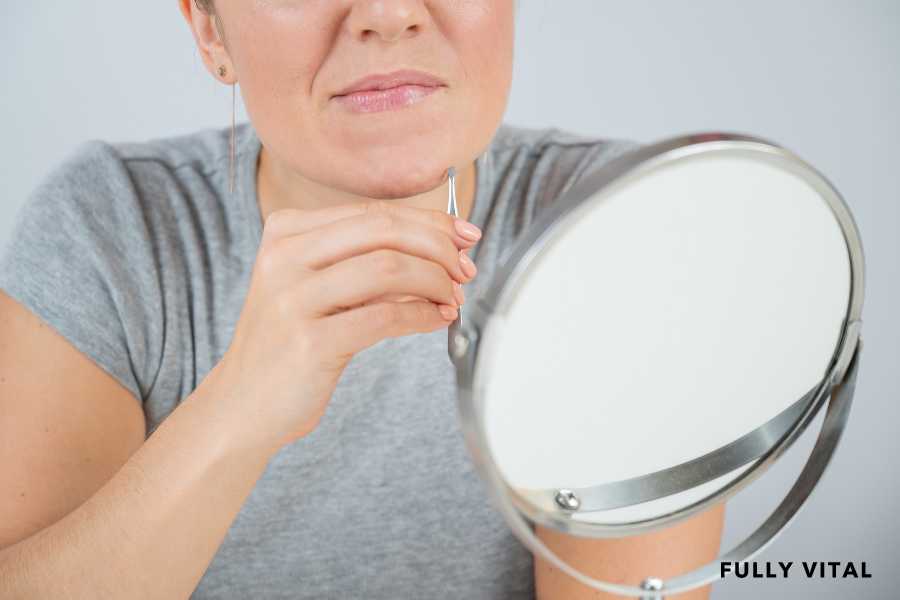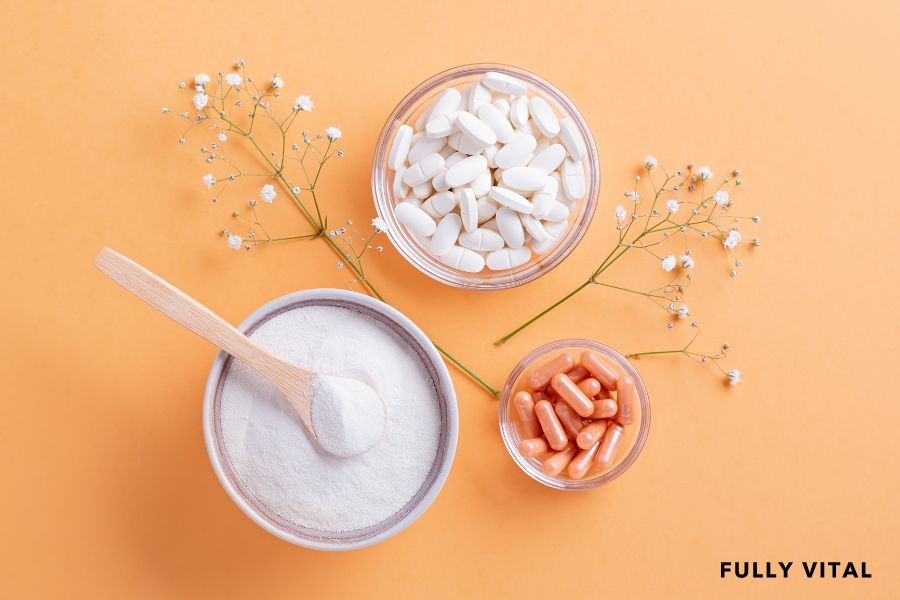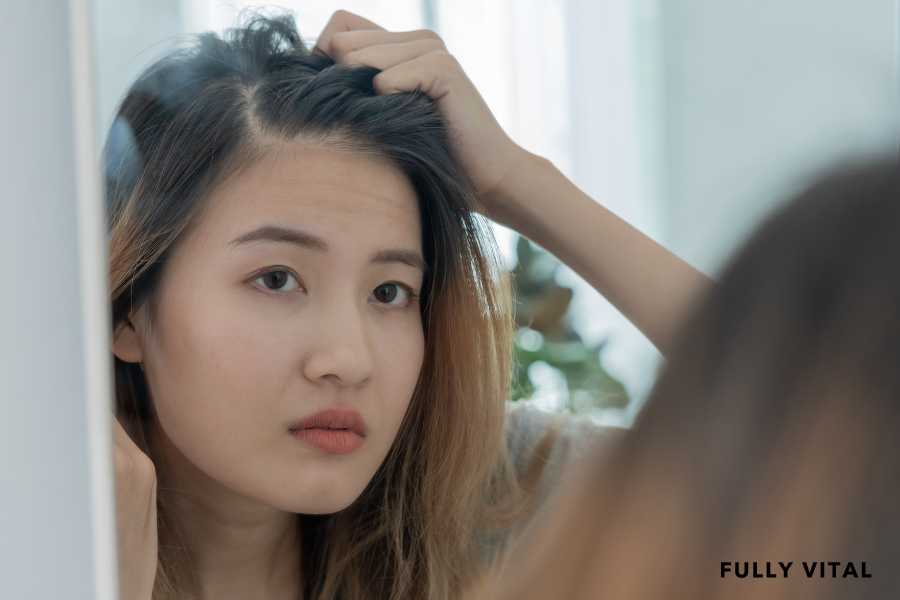
Hirsutism: Unveiling The Essentials For Hair Growth In Women
Welcome to our comprehensive guide on hirsutism – a topic of significance for women of all hair types who are seeking effective ways to stimulate hair growth.
In this article, we'll delve into the nuances of hirsutism, understand its importance, explore its functioning, highlight its benefits, discuss potential downsides, and even discover alternatives.
So, let's jump right in and uncover the key aspects of hirsutism in a friendly, conversational tone.

I LOVE MY HAIR NOW
FullyVital hair serum and hair vitamins made tremendous improvements in my hair. I truly love my hair now.
Dorit S.,
What Is Hirsutism?
Hirsutism is a common condition that leads to the growth of excessive hair in women, often in areas where men typically have more hair.
This includes the face, chest, back, and abdomen. While some level of hair growth is normal, hirsutism results in darker, coarser hair that can impact a woman's self-esteem and confidence.1

Why Is Hirsutism Important?
Hirsutism holds significance for women seeking to understand their bodies and manage their overall well-being.
While excessive hair growth might appear as a cosmetic concern, it can often be an outward manifestation of underlying hormonal imbalances or medical conditions.2
Recognizing the importance of hirsutism entails several key reasons:
Indicator of Hormonal Imbalance
Hirsutism often results from elevated levels of androgens, which are male hormones.
These hormonal fluctuations can signify an imbalance in the endocrine system, potentially indicating conditions like polycystic ovary syndrome (PCOS) or adrenal disorders.
Addressing the root cause of hirsutism becomes vital to restore hormonal equilibrium.
Reflection of Overall Health
The presence of hirsutism can serve as a visual cue to women that something might be amiss with their health.
While it might not always indicate a serious condition, it prompts individuals to consider a holistic approach to their well-being, including diet, exercise, stress management, and medical consultation.
Psychological Impact
Excessive hair growth can affect a woman's self-esteem and body image.
The emotional toll of hirsutism underscores the importance of addressing the condition for psychological well-being.
By managing unwanted hair growth, women can regain their self-confidence and feel comfortable in their own skin.
Tailored Treatment
Recognizing the importance of hirsutism prompts women to seek professional advice for personalized treatment options.
Each woman's body is unique, and understanding the underlying causes can lead to targeted interventions, whether through lifestyle adjustments, medical treatments, or a combination of both.
Empowerment through Knowledge
By understanding hirsutism, women can make informed decisions about their health.
Knowledge about the condition empowers individuals to seek medical assistance when necessary, explore effective hair removal methods, and consider lifestyle changes that contribute to hormonal balance.
How Does Hirsutism Work?
Hirsutism operates through a complex interplay of hormones and hair follicles, resulting in the excessive growth of coarse, dark hair in areas typically associated with male hair patterns.
Understanding how hirsutism works requires delving into the underlying mechanisms and factors contributing to this condition:
Hormonal Imbalance
At the core of hirsutism is an imbalance in hormone levels, primarily involving androgens – the male hormones.
Elevated levels of androgens, such as testosterone, in women can lead to the overstimulation of hair follicles.
These follicles become more sensitive to androgen signals, causing them to produce thicker and darker hair.
Androgen Receptors
Hair follicles possess androgen receptors on their surfaces.
When these receptors are activated by high levels of androgens, they initiate a series of biochemical responses within the follicle.
This results in the conversion of fine, vellus hairs (soft, light-colored hairs) into terminal hairs (thicker, darker hairs).
Hair Growth Phases
Hair growth occurs in cycles, comprising the anagen (growth), catagen (transitional), and telogen (resting) phases.
In individuals with hirsutism, the anagen phase is prolonged due to androgen stimulation.
As a result, affected hairs continue to grow and remain in the anagen phase for longer durations.
Follicle Sensitivity
Androgen sensitivity varies among individuals and across different areas of the body.
Hair follicles in hirsutism-prone areas, such as the face, chest, and back, have higher sensitivity to androgens.
This heightened sensitivity leads to the development of terminal hairs in these regions.
Contributing Factors
Various factors can contribute to the development of hirsutism, including genetics, medical conditions like polycystic ovary syndrome (PCOS), and certain medications.
Genetics play a role in determining an individual's predisposition to hirsutism, while conditions like PCOS can lead to increased androgen production.
Some medications, such as certain steroids, can also disrupt hormone balance and trigger hirsutism.
What Are The Benefits Of Hirsutism?
While hirsutism itself is not considered beneficial, understanding this condition can offer several advantages for women seeking to manage their hair growth and overall well-being.
By exploring the nuances of hirsutism, individuals can gain insights that contribute to informed decision-making and improved quality of life:
Empowerment through Knowledge
Learning about hirsutism empowers women to take control of their bodies and make informed choices.
Understanding the causes, symptoms, and available treatments enables individuals to actively participate in their healthcare journey.
Identification of Underlying Health Concerns
Hirsutism can serve as a signal that prompts women to explore potential underlying health issues.
In cases where hirsutism is a symptom of conditions like polycystic ovary syndrome (PCOS), early detection and intervention are crucial for managing overall health.
Holistic Approach to Well-Being
Acknowledging hirsutism encourages women to adopt a holistic approach to their well-being.
This may involve making lifestyle changes such as maintaining a balanced diet, engaging in regular exercise, managing stress, and prioritizing self-care.
Tailored Treatment Options
Understanding hirsutism's causes and implications allows women to explore a range of treatment options tailored to their specific needs.
By consulting healthcare professionals, individuals can select interventions that align with their goals and preferences.
Psychological Well-Being
Addressing hirsutism can have positive effects on psychological well-being.
Managing unwanted hair growth can enhance self-esteem and body confidence, leading to improved mental health and a more positive self-image.
Proactive Self-Care
Embracing the knowledge about hirsutism encourages proactive self-care.
Women can adopt strategies to manage their hair growth, explore effective hair removal methods, and develop self-confidence in their appearance.
Are There Any Downsides To Hirsutism?
Indeed, hirsutism comes with several downsides that can impact a woman's physical, emotional, and psychological well-being.
While not inherently harmful, the presence of excessive and unwanted hair growth can lead to various challenges:
Self-Esteem and Body Image
Hirsutism can negatively affect a woman's self-esteem and body image.
Experiencing visible and unwanted hair growth in traditionally male-pattern areas can lead to feelings of self-consciousness, embarrassment, and lowered self-confidence.
Social and Emotional Impact
Women with hirsutism might avoid social situations or activities that expose their condition, fearing judgment or scrutiny.
This social withdrawal can impact their emotional well-being, leading to isolation, anxiety, and even depression.
Grooming and Maintenance Efforts
Managing excessive hair growth often requires frequent and time-consuming grooming efforts.
Constantly waxing, shaving, or using other hair removal methods can become a burden, taking a toll on a woman's time and energy.
Financial Considerations
Investing in various hair removal products, treatments, or procedures can lead to financial strain over time.
The costs associated with maintaining smooth skin and managing hirsutism can add up significantly.
What Is The Cause Of Hirsutism?
Hirsutism isn't just a random occurrence; it's rooted in the intricate dance of hormones within your body.
Understanding its cause can help demystify the journey towards managing it and achieving your desired hair growth goals.
Unveiling the Factors Behind Hirsutism:
-
Hormonal Imbalance: Elevated androgens, commonly known as male hormones, play a pivotal role.
-
Genetics: Family history can predispose individuals to hirsutism.
-
Medical Conditions: Conditions like PCOS and adrenal disorders can contribute.
-
Medications: Some drugs, such as certain steroids, can disrupt hormonal balance.
What Causes Hirsutism To Get Worse?
Hirsutism isn't static; its intensity can fluctuate.
Unraveling the factors that exacerbate hirsutism can help you navigate the triggers and take proactive steps towards maintaining smoother, radiant skin.
Factors Aggravating Hirsutism:
-
Hormonal Imbalance: Imbalances in androgen levels can amplify hirsutism.
-
Lifestyle Choices: Poor diet, sedentary habits, and stress can contribute.
-
Medical Conditions: Conditions like PCOS can exacerbate hirsutism.
-
Medication: Certain drugs can worsen the condition as a side effect.
Is Hirsutism Lifelong?
The million-dollar question – is hirsutism here to stay? Let's delve into the temporal nature of hirsutism and gain clarity on whether it's a lifelong companion or a temporary guest.
Understanding the Duration of Hirsutism:
-
Varied Persistence: Hirsutism's duration can vary from person to person.
-
Long-Term Management: While it might not completely vanish, effective management is possible.
-
Targeted Treatments: Medical interventions and lifestyle adjustments can help control its impact.
How Do You Get Rid Of Hirsutism Naturally?
Naturally managing hirsutism is a route many consider, seeking harmonious solutions aligned with their body's rhythms.
Discovering natural methods can be the first step towards achieving the hair growth balance you desire.
Exploring Natural Approaches:
-
Healthy Diet: A diet rich in nutrients supports hormonal balance.
-
Physical Activity: Regular exercise aids in hormone regulation.
-
Stress Management: Techniques like yoga and meditation contribute to well-being.
-
Herbal Remedies: Some herbs like spearmint tea are believed to have anti-androgenic properties.
What Happens If Hirsutism Is Left Untreated?
Leaving hirsutism unattended can have repercussions that extend beyond the surface.
Understanding the potential consequences of untreated hirsutism underscores the importance of taking action.
Unveiling the Consequences of Neglect:
-
Impact on Self-Esteem: Unwanted hair growth can lead to lower self-confidence.
-
Underlying Conditions: Hirsutism can be a symptom of underlying health issues like PCOS.
-
Psychological Strain: Emotional distress, anxiety, and depression can result.
-
Long-Term Persistence: Without intervention, hirsutism may continue or worsen over time.
Why Hirsutism Is A Crucial Topic For Our Hair Growth Product Company
Unveiling the History of Hirsutism:
Understanding the Evolution:
-
Hirsutism has been a concern for women across centuries, with historical records documenting various remedies and treatments.
-
Historical context highlights the societal impact of hirsutism and the importance of addressing it.
Pioneering Treatments:
-
Early treatments ranged from abrasive methods to herbal remedies, underscoring the persistent quest for solutions.
-
Historical insights offer valuable lessons in the evolution of managing unwanted hair growth.
Navigating the Current Environment:
Advancements in Treatment:
-
Contemporary medical advancements provide more effective ways to manage and reduce hirsutism.
-
Laser hair removal, medications, and cosmetic procedures offer tailored solutions for women seeking relief.
Empowerment Through Knowledge:
-
The digital age has democratized information, empowering women to seek answers, share experiences, and make informed choices.
-
Social media and online communities provide platforms for hirsutism discussions and support networks.
Shaping the Future of Hirsutism:
Holistic Approaches:
-
The future of hirsutism management lies in holistic approaches that consider not only hair growth but also overall well-being.
-
Incorporating lifestyle changes, stress management, and wellness practices can redefine how we approach hirsutism.
Advances in Medical Science:
-
Ongoing research into hormonal regulation and targeted treatments holds promise for more effective interventions.3
-
Personalized medicine and innovative therapies could revolutionize the way hirsutism is addressed.
Empowering Conversations:
-
The future involves open dialogues that destigmatize hirsutism, ensuring that women can openly discuss their experiences and concerns.
-
Fostering awareness can lead to earlier diagnosis, more accessible treatments, and improved quality of life.
Elevate Your Hair Journey With Fully Vital!Unlock the Secret to Radiant Hair Growth and Confidence At Fully Vital, we're dedicated to transforming your hair journey into a vibrant story of empowerment and self-expression. Discover our range of science-backed hair growth products that redefine what's possible for your locks:
Your hair deserves the best – and that's exactly what we offer at Fully Vital. Join us on this exciting adventure towards vibrant hair growth and a healthier connection with your locksw. |
Final Thoughts On Hirsutism
Our exploration of hirsutism has shed light on a topic that goes beyond the surface – it's a journey of understanding, empowerment, and embracing one's uniqueness.
Hirsutism holds significance for women seeking vibrant hair growth and overall well-being.
From unraveling its causes to considering natural approaches and delving into its impact, we've embarked on a comprehensive journey to demystify hirsutism.
As we navigate the historical context, current landscape, and future possibilities, it becomes evident that hirsutism is more than just a cosmetic concern.
It's an opportunity to embrace knowledge, advocate for open conversations, and explore innovative solutions that empower every individual on their hair growth journey.
At Fully Vital, we stand committed to providing a variety of hair growth products designed to support healthier, more resilient hair.
Our mission is to help you foster a harmonious relationship with your locks, ensuring that your journey towards radiant hair growth is met with confidence and vitality.
Embracing your uniqueness is a step towards owning your story.
Let's journey together towards a future where hirsutism is understood, addressed, and celebrated as a part of your individuality.
Frequently Asked Questions About Hirsutism
Is hirsutism a common condition?
Hirsutism is relatively common, affecting a significant number of women worldwide.
It's important to note that while some degree of hair growth is normal, excessive and unwanted hair growth characterizes hirsutism.
Are there any home remedies for hirsutism?
While home remedies can't entirely eliminate hirsutism, some individuals find relief through techniques like turmeric paste, spearmint tea, and sugar waxing.
However, consulting a medical professional is recommended for personalized guidance.
Can hirsutism be a symptom of a more serious health issue?
Yes, in some cases, hirsutism can be indicative of an underlying health concern, such as polycystic ovary syndrome (PCOS) or adrenal disorders.
Consulting a healthcare professional can help identify and address any potential underlying issues.
Is hirsutism solely a cosmetic concern?
Hirsutism goes beyond the surface – it can be a reflection of hormonal imbalances and underlying health conditions.
While it has aesthetic implications, it's essential to recognize its potential significance for your overall well-being.
Can hirsutism develop suddenly?
Yes, hirsutism can appear suddenly due to hormonal fluctuations, medical conditions, or lifestyle changes.
It's crucial to consult a healthcare professional if you notice rapid and significant hair growth.
What's the role of hormones in hirsutism?
Hormones, particularly androgens, play a central role in hirsutism.
Elevated androgen levels can stimulate the growth of coarse hair in unwanted areas, leading to the characteristic symptoms.
Is waxing or shaving safe for managing hirsutism?
Waxing and shaving are common hair removal methods, but they provide temporary relief and can sometimes exacerbate skin irritation.
Consider discussing long-term solutions with a dermatologist.
Does diet affect hirsutism?
While there's no specific "hirsutism diet," maintaining a balanced diet rich in nutrients can support hormonal balance.
Focus on consuming whole foods, lean proteins, and healthy fats.
Can stress worsen hirsutism?
Stress can contribute to hormonal imbalances, potentially exacerbating hirsutism.
Incorporating stress-reduction techniques like meditation and deep breathing can positively impact your condition.
Is there a connection between hirsutism and fertility?
Hirsutism can be linked to fertility issues, especially if it's associated with conditions like PCOS.
Managing hirsutism and addressing underlying health concerns can improve fertility outcomes.
Can herbal supplements help with hirsutism?
Some herbal supplements, such as spearmint tea, are believed to have anti-androgenic properties.
However, consult a healthcare professional before incorporating supplements into your routine.
Sources:
-
Hafsi, W., & Badri, T. (2020). Hirsutism. PubMed; StatPearls Publishing. https://www.ncbi.nlm.nih.gov/books/NBK470417/
-
Mihailidis, J., Dermesropian, R., Taxel, P., Luthra, P., & Grant-Kels, J. M. (2017). Endocrine evaluation of hirsutism. International Journal of Women’s Dermatology, 3(1), S6–S10. https://doi.org/10.1016/j.ijwd.2017.02.007
-
Debela, D. T., Muzazu, S. G., Heraro, K. D., Ndalama, M. T., Mesele, B. W., Haile, D. C., Kitui, S. K., & Manyazewal, T. (2021). New approaches and procedures for cancer treatment: Current perspectives. SAGE Open Medicine, 9, 205031212110343. https://doi.org/10.1177/20503121211034366







